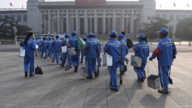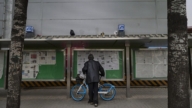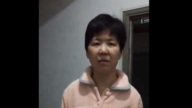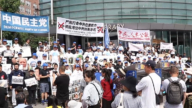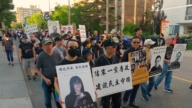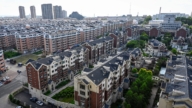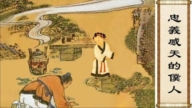【新唐人2013年01月05日訊】2012年,沒有如瑪雅人所預言的出現世界末日,但是對中國民眾而言,卻如末日般的黑暗—-中共貪官吞地強拆、城管暴力行兇、公檢法貪贓枉法、暴力截訪迫害訪民、殘酷鎮壓示威群眾等等,數不勝數的流血事件不斷在大陸各地上演著。原本中國民眾還對十八大抱有一線希望,期盼著新政府會有所改變,但是當殘酷的現實擺在眼前時,絕望使他們徹底的覺醒了。
近年來,中國大陸各地每天都發生數百起的群眾事件。據不完全統計,僅2010年,就發生群眾事件十八萬起,並且這個數字還在逐年翻倍遞增著。尤其2012年,中共日益高壓的統治和政府官員的極度腐敗,使中國民眾的積怨到達了前所未有的頂峰。於是各地爆發了諸如警民衝突、藏人自焚、殺官襲警、圍攻政府、萬人上訪、大型示威遊行等「官逼民反」類型的事件。
隨著「十八大」的召開,對生活現狀近乎絕望的中國百姓,把僅有的希望寄託在中共的新領導班子上,期待著他們能夠做出改革,懲治腐敗。但是,在中共新政底下,當局頒布網路實名制、對網路舉報視而不見、各地更加囂張的貪官、元旦數千訪民被捕…,這些在在澆滅了中國百姓心中最後一線希望之火,絕望使民怨徹底沸騰起來,忍無可忍的百姓們紛紛走出家門,用各種方式加入示威、抗暴、反腐敗、反壓迫的行列中去。
中國憲政學者陳永苗:「 現在的國家領導人,他已經是在一個腐爛鋼鐵大機器裏面一個比較大的螺絲釘,他已經沒有辦法帶動這個大機器的良性循環了。 這國家根本就是沒藥可救了。」
僅僅元旦前後,全中國就發生了十幾起重大的群眾事件,其中包括:2012年12月30號,雲南臨滄數百村民衝上公路,抗議官員侵吞賣地款,遭武警鎮壓;2012年年底,湖南洪江市興建水電站,強迫2萬5000農民搬遷,五天內四農民自殺抗議;而,東莞數千民工包圍派出所,與數百警察對峙,只為了因工傷搶救不及時的四川民工討個公道;2013年元旦,湖南邵陽城管暴力執法,打傷司機,現場數千群眾怒砸執法車等等。
湖南司機劉先生:「已經麻木了,因為看多了吧,這種事情。這是這個體制害人,就是形成了一個惡性循環。反腐我不相信了,真的要反覆,整個只要是當公務員的,全都是貪官!沒有一個是清廉的。我不聽他宣傳,我要看到事實。」
與此同時,全國各地的訪民前仆後繼的湧向北京,明知道等待他們的只有截訪、抓捕、關押、迫害,甚至是勞教判刑,訪民們依然豪不退縮的堅持一次次的上訪,然後被關押,放出來繼續上訪,甚至有訪民不得不用生命來捍衛自己的權益,就在1月3號,一位來自陝西的老訪民絕望之下闖天安門,打算跳城樓自盡。
《六四天網》負責人黃琦: 「他們需要向各界說明,在中共大陸民眾的冤苦沒有地方申訴,所以他們不得不採取跳樓、自殺等一切激烈的手法,應該說民眾的這種情況,並不是他們自己願意這樣做的,他們是被逼無奈走上了這條路。」
四川成都的「中國天網人權中心」(《六四天網》)負責人黃琦說,在漫長的上訪過程中,中國訪民們終於認識到,中國大陸的許多問題不僅僅是個人問題,而是整個社會的普遍問題。而恰恰是現有的社會制度造成了這些社會問題和矛盾,現在訪民們和覺醒的中國民眾,不僅想要解決他們自己的問題,更想要改變整個社會和現有的體制,甚至是推翻這個一黨專政的政權。
採訪/朱智善 編輯/張天宇 後製/ 王明宇
China’s Mass Protests Surge During 2013 New Year’s Day Holiday
The rumored “end of the world”
did not happen at the end of 2012.
However, people living under the rule of the
Chinese Communist Party (CCP) seem to have reached the end of their tether.
Why? They face land grabbing and forced
evictions under corrupt CCP officials;
violent enforcement of rule by law
from urban management officers;
and mafia-style interception of petitioners, as well
as repression of protesters by local authorities.
Bloody police-civilian clashes are
incessantly staged nowadays in China.
These harsh realities have now awakened
Chinese people who originally placed a glimmer
of hope in the new CCP leadership changing.
In recent years, hundreds of mass protests
have occurred every day across China.
Incomplete statistics show that in 2010 alone, China saw
180,000 mass protests, with numbers growing yearly.
In 2012, Chinese people’s grievances peaked, oppressed
by high-handed CCP rules and official’s extreme corruption.
Nationwide incidents erupted, including police-civilian
clashes, Tibetan self-immolations, murder of CCP officials,
attacks on police, and mass besieging city halls.
China also saw petitioning involving over 10,000
people, as well as large-scale demonstrations.
Along with the 18th Party Congress being held, Chinese
civilians pinned their last hope on the new CCP leadership
to launch reforms and punish corruption.
However, in reality, the new CCP administration has
quickly put the internet ‘real-name system’ into practice.
Online disclosure of corruption and scandals
involving CCP officials were glossed over.
Thousands of petitioners across China
were arrested during 2013 New Year holiday.
This harsh reality has now forced more Chinese
citizens to join the protests against the CCP tyranny.
Chen Yongmiao: “Now the CCP regime’s leader
is just a big cog in a large rotten machine.
He has no way to make the machine run
smoothly, for the regime is completely incurable.”
During the 2013 New Year’s holiday, over
a dozen mass protests occurred in China.
This included on December 30, when hundreds
of Yunnan villagers protested against local officials.
The local officials were embezzling land-sale revenues,
but protesters were repressed by armed police.
In Hunan, the CCP authorities in Hongjiang
city forced 25,000 farmers to relocate,
to make way for a hydroelectric station project.
Within five days, four farmers committed
suicide to protest against this policy.
In Guangdong, thousands of migrant workers
besieged a police station in Dongguan.
This resulted in a confrontation with hundreds of police.
The mass siege was to seek justice for
a Sichuan migrant worker who was injured
at work, and died due to a delayed rescue.
On New Year’s Day 2013, an urban management
squad in Shaoyang, Hunan province, wounded a driver.
The act outraged thousands of local residents
who smashed a law enforcement vehicle.
Mr. Liu, driver from Hunan: “I have become numb
about such news, for I’ve seen too many already.
It’s the existing political system that victimizes
the public, which finally forms a vicious cycle.
I don’t believe the official touting of anti-corruption at all.
But I believe that all civil servants are all corrupt.
Not one single official is incorruptible in China. I’ve
never listened to its propaganda, I just believe the reality.”
During the New Year holiday period,
nationwide petitioners flocked to Beijing.
They risked being intercepted, arrested,
detained, and even being jailed.
These petitioners simply continued their
petitioning after release from custody.
Some even risked their lives to
defend their own rights and interests.
On January 3, in desperation, an elderly
petitioner from Shaanxi, tried to end his
own life by jumping from Tiananmen Tower.
Huang Qi, Director, China Tianwang Human Rights Service:
“They’re just telling the world that in the CCP-ruled China,
people have no channel to resolve their grievances.
They’re forced to resort to every extreme method,
including jumping from a building or committing suicide.”
Huang Qi says that in their long process of petitioning,
China’s petitioners have finally come to understand a reality.
That is, lots of problems in China are not only
of individuals, but are common to the whole society.
It is the existing social establishment that
has created these problems and conflicts.
Huang Qi reveals that currently, China’s petitioners and
the awakened citizens continue to defend their own rights.
They also attempt to help change the social establishment,
and even to help overthrow the one-party dictatorship.


